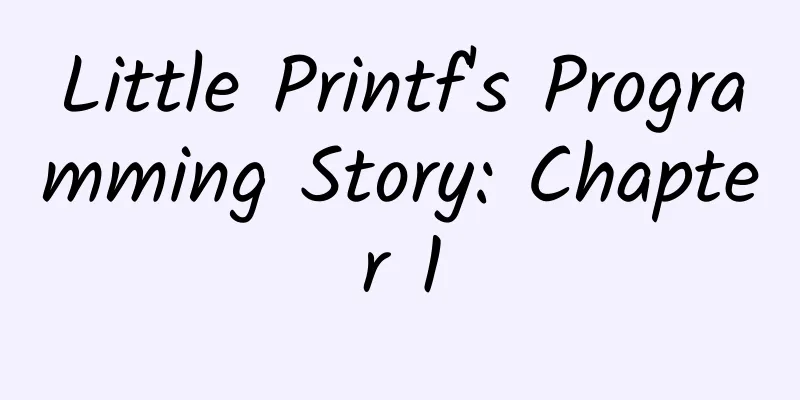Little Printf's Programming Story: Chapter 1

|
The original author, Fred Hebert, is a Canadian programmer who wrote an introductory book on Erlang. The English name of this story is The Little Printf. It was shared by him at the CityCode conference in Chicago in October this year. It imitates the French classic "The Little Prince" and is interspersed with some of his own experiences in learning programming. This short story has a total of 11 chapters. According to the author's introduction, the illustrations should be drawn by himself. Friends who want to see the original author's sharing can go to YouTube. If there is anything wrong with the translation, please correct it!
Chapter 1 I am glad that I was born before computers and video games became popular. My friends and I often played outdoors, and we could enjoy inventing games at that time. We would play the hero, holding a branch that would instantly transform into a bow, a gun, a sword, or a telescope. We could turn the branch into anything except a boomerang, because once you threw it, you had to pick it up again. As I grew older, it became a little embarrassing to continue playing these games. You couldn't use pine cones as grenades and pretend you had superpowers because the other kids thought the adult world was more interesting. I didn't fit in anymore. Eventually, I had to grow up. But, it was still a very lucky childhood. Later, I had the opportunity to play video games and own a computer. In the games and computers, the fictional world I had always dreamed of appeared in front of me. I was completely immersed in it, and in that world, I lived a completely different life. But most video games have one thing in common: you can’t create, you can only deal with and consume. When I was a teenager, I participated in improvisational theater. In the theater, I could communicate with others, create together, and let my imagination run wild. Of course, the improv scene in Quebec is different; there's an ice rink inside - it's all about hockey. From 2005 to 2008, I studied multimedia technology at university and came across programming by chance. I thought programming was incredible! I was full of creativity and could make money! At that time, I designed my first game prototype and jumped for joy. But I was later told, "That's not a real video game." "It's just an HTML form, and it would be better if you replaced the text and options with arrays. The code needs to be cleaned up a bit more." I was a little disappointed; the game was actually designed based on a script I wrote, which allowed players to "choose their own adventure journey." However, I also realized that if I wanted to make what I developed be recognized by more people, I had to learn a lot more related knowledge. I had to learn "real programming". From JScript in GUI tools, to something better, like PHP. So I learned PHP, and JavaScript. Then someone told me what real programming was; PHP sucked. Someone said maybe I could try Python, so I did. However, real programmers know more advanced things. Python's lambda is not enough, and object-oriented programming is not enough. Others told me that I'd better read SICP (Structure and Interpretation of Computer Programs) next, because this book is the Bible in the field of computer science. That’s how I got into Scheme. Later I bought K&R (C Programming) because real programmers in the real world know C. I signed up for a training course at a local university because real programmers know data structures and math, and I learned a little bit of that. I started reading papers and technical books because real programmers need to keep up with the times and master the latest algorithms. In the process, I learned Erlang and started making a living with it. I wrote a book about Erlang. Interestingly, no one questioned whether I could really write a book or draw illustrations. Anyway, I got a job teaching people Erlang without ever doing production development in Erlang. Original text: http://ferd.ca/the-little-printf.html |
<<: A review of the top 10 losers and winners of 2015: Lei Jun and Luo Yonghao are on the list
Recommend
Is it expensive to customize the Jining Book Mini Program? Jining Books Mini Program Customization Cost and Process
According to industry insiders, mini programs wil...
Black Hat Blue Ocean Knowledge Paid Project, it is no longer a dream to easily earn over 10,000 yuan a month! Actual monthly income of 30,000-50,000 yuan project
Black hat blue ocean knowledge paid project, cont...
2021 Team Value Investment Director Wu Muyang and Wu Muyang's Circle (Medium and Long-term Bands)
2021 Team Value Investment Director Wu Muyang and...
SAIC MG and Zhiji join forces to attend the 2024 Geneva Motor Show
(Shanghai, February 20, 2024) At the 2024 Geneva ...
Everything you need to know about the Android image Bitmap class
Bitmap Introduction Bitmap is an image file forma...
New Media Operation丨How to operate self-media platforms such as Toutiao and Baijiahao?
Today I will share with you how to become a novic...
Is Wenchang Tower really useful? Correctly understand the role of Wenchang Tower
The function of Wenchang Tower is to promote chil...
Is there an inevitable connection between deafness and dumbness? How can we protect our ears scientifically?
The importance of hearing is self-evident. This y...
About 120 million years old! Do you know Zhoushan's "sea bonsai"?
Zhoushan Islands There are tall, wide, fairy-like...
“Meituan Takeout” product analysis report!
Take-out has become a must-have for urbanites, sa...
5 Steps to Improve Your App Store Product Description!
Like moving house or getting married, launching a...
To attract traffic to your product, you need to master the three "relative truths" of traffic promotion
Generating traffic is essentially about generatin...
Is the information flow optimization effect so good? Optimization skills of the information flow girl with a monthly salary of 2w+!
A few days ago, the editor was thinking about one...
This crab can open coconuts with its bare hands and even climb trees to eat birds!
In the hot summer, it is best to go to the beach ...
Tianshui Mini Program Customization Company, how much does it cost to customize a paper product mini program?
WeChat Mini Program is an application that users ...









